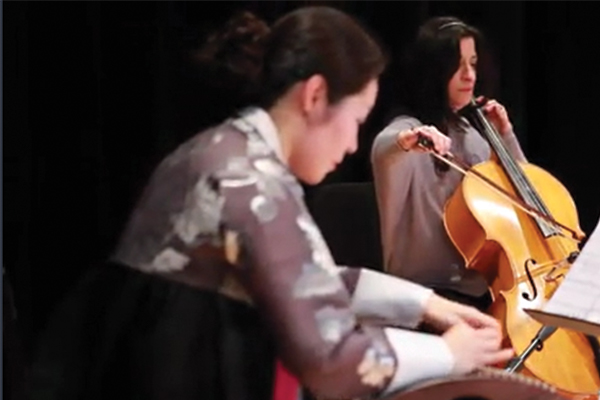
Faculty Recital: Think Globally, Play Locally I
Recorded in Antonello Hall, Released on MacPhail’s Performance Archive and Facebook Live
Friday, March 26th, 2021, 7pm
Soojin Lee, gayageum
Jacqueline Ultan, cello
“Miryang Arirang” by Jung, Eun-sun
An arirang is specific type of Korean folk song. There are many versions and variations of arirang depending on the region but they all have the same refrain with “arirang- arirang- arariyo.” This music, Miryang Arirang, is the arirang from the Miryang area. The original folk song has a simple melody line and these lyrics:
Look at me, Look at me, Look at me,
As you look at a flower in the middle of winter, please look at me
Ari-ari-rang Arariyo
This music was commissioned by the duo VoGa (Voice: Park, Mikyoung, Gayageum: Soojin Lee) in 2020. Today, Jacqueline and Soojin will play the music with the cello and the 25 string gayageum.
“Moon-light” by Kwak, Soo-eun
This music was composed for the 25 string gayageum and the cello in 2008. This kind of newly composed Korean music is a modern trend in gugak (Korean music). The composer was inspired by the Moonlight sonata by Beethoven, but she tried to follow her own emotion. Kwak’s Moon-light begins in a minor key and conveys sadness but changes to a major key towards the end while pursuing her own feeling.
Ora Itkin, piano
“Alma Brasilera” (Chôros No. 5) by Heitor Villa-Lobos (1887-1959)
Heitor Villa-Lobos is probably the best-known South American composer and one who blended both Brazilian folk music and European classical music into his work. He was largely self-taught and spent ten years on expeditions into the interior of Brazil absorbing indigenous musical influences. The title “Alma Brasilera” translates from Portuguese as “Brazilian Soul” and was composed in Rio Di Janeiro in 1925 and is number 5 in his series of 14 Chôros. The word Chôros means “weeping” and is a type of music played by Brazilian street musicians with African and European instruments. Villa-Lobos considered his Chôros series to be an extension of this street music that further blends with indigenous and popular music. He was a prolific composer with over 2000 known works, including orchestral, chamber, instrumental and vocal works. He wrote and conducted patriotic (including propaganda) music and educational music as the director of the Superintendência de Educação Musical d Artistica. After the fall of dictator Getúlio Vargas in 1945 he was able to travel widely giving concerts, composing for leading musicians of the time, and fulfilling commissions, including composing and conducting the soundtrack for MGM’s Green Mansions, staring Audrey Hepburn and Anthony Perkins.
Sarah Hruska Olson, soprano
Jean Seils, guitar
Selections from Opus 39, Sei Cavatine for voice and guitar by Mauro Giuliani
Text and translation from the Tecla Editions of “Sei Cavatine for voice and guitar or piano” © 1986, Brian Jeffery.
1. Par che di giubilo
L’alma deliri;
Par che mi manchino
Quas’i sospiri,
Che fuor del petto
Mi Balz’il cor.
Quant’è più facile
Che un gran diletto
Giung’ad accidere
Che un gran dolor.
It seems that my soul is delirious with joy, that my sighs are gone, that my heart leaps out of my breast.
How much easier it is for a great delight to kill me than a great sorrow.
2. Confuso, smarrito
Spiegar ti vorrei
Che fosti, che sei
Intendimi, oh Dio!
Parlar non poss’io,
Lontano, se mai
Di me ti rammenta,
Io voglio, tu sai
– Sí, tu sai –
Che pena! Gli accenti
Confonde il martir.
Confused, bewildered, I would like to explain to you what you were and what you are; hear me!
Oh God! I cannot speak, I feel that I am dying.
Far away, if ever you remember me, I want – you know – yes, you know! Oh, what sorrow! My pain confuses my words.
3. Alle mie tante lagrime,
Al mio crudel dolore,
Se non ti muove amore
Hai di macigno il cor.
Pianger farebbe un sasso
Uno si lungo affanno;
Se tu non sei tiranno,
Pianger dovresti ancor.
At the sight of my many tears, of my cruel pain, if love does not love you, your heart is made of stone.
Such long torment would make a stone weep. If you are not a tyrant, you ought still to be weeping.
4. Ah! Non dir che non t’adoro
Se finor penai cosi.
T’amerò, mio bel tesoro,
Fin che spiri all-aure il di.
Fin dal di che ti mirai
Sol tu fosti il mio pensier.
Mi feristi, ed io restai,
E ferito e prigionier.
Cara imago del mio bene,
Vivi sempre nel mio amor;
Saran dolci le mie pene
Se son figlie del mio amor.
Don’t say that I don’t adore you, since I’ve suffered so much so far. I will love you, my beautiful treasure, until the day dies with the breezes.
Since the day when I saw you, you were my sole thought. You wounded me, and I remained, wounded and a prisoner.
Dear image of my beloved, you live forever in my love; my sorrows will be sweet if they are born of my love.
